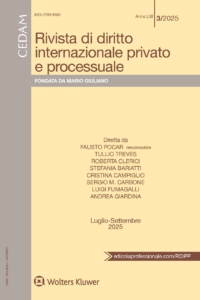Views
Brazilian Supreme Court on the Hague Child Abduction Convention
Guest post by Janaína Albuquerque, International Family Lawyer; Research Associate at the NOVA Centre for the Study of Gender, Family and the Law; Legal Coordinator at Revibra Europa. Janaína represented Revibra, Instituto Maria da Penha and Instituto Superação da Violência Doméstica as amici curiae in the cases discussed below.
The Brazilian Supreme Court has recently delivered a landmark judgment in two Direct Actions of Unconstitutionality (Ações Diretas de Inconstitucionalidade, or ADIs), namely ADI 4245 and ADI 7686, concerning the application of the 1980 Hague Convention on the Civil Aspects of International Child Abduction(1980HC). Despite their denomination, these actions did not aim to invalidate the Convention, but rather to harmonize its interpretation with the principles enshrined in the Brazilian Federal Constitution.[1] Read more
EU modernises consumer dispute resolution: An overview of the new ADR Directive
By Alexia Kaztaridou (Linklaters)
On 25 September 2025, the Internal Market and Consumer Protection Committee (IMCO) of the European Parliament approved the text of the political agreement on the Alternative Disputes Resolution for Consumer Disputes Directive. This Directive establishes a framework for resolving through ADR procedures contractual domestic and cross-border consumer disputes arising from the sale of goods or provision of services between consumers and traders within an EU context. The amendments to the prior Directive aim to modernise the existing framework in light of new consumer trends, such as the growth of e-commerce, and bring significant changes across several areas, enhancing the protection for consumers and clarifying obligations for traders and ADR entities. The Directive maintains its minimum harmonisation approach, allowing Member States to provide for stronger consumer protection. Read more
US Supreme Court: Judgment in Smith & Wesson Brands, Inc. et al. v. Estados Unidos Mexicanos (Mexico) – A few takeaways

Written by Mayela Celis, Maastricht University
In June 2025, the US Supreme Court delivered its opinion in Smith & Wesson Brands, Inc. et al. v. Estados Unidos Mexicanos (Mexico) 605 U.S. 280 (2025). The Opinion is available here. We have previously reported on this case here, here and here (on the hearing).
As previously indicated, this is a much-politicized case brought by Mexico against US gun manufacturers, alleging inter alia negligence, public nuisance and defective condition. The basic theory laid out was that defendants failed to exercise reasonable care to prevent the trafficking of guns to Mexico causing harm and grievances to this country. In this regard, the complaint focuses on aiding and abetting of gun manufacturers (rather than of independent commission).
In a brilliant judgment written by Justice Kagan, the Court ruled that PLCAA bars the lawsuit filed by Mexico. Accordingly, PLCAAS’s predicate exception did not apply to this case. Read more
News
Inaugural event European Civil Justice Centre
In 2025, the European Civil Justice Centre (ECJC) was established at Erasmus School of Law in Rotterdam. This Centre was set up to facilitate the collaboration of scholars and other stakeholders across Europe and beyond in conducting research and related activities with a view to promoting access to justice. The Centre consolidates extensive work spearheaded by Erasmus School of Law civil justice scholars over the past fifteen years (see www.euciviljustice.eu), benefits in particular from support by the KU Leuven, and builds on collaborations with academics, practitioners and policy-makers around the globe. Read more
Crossroads in Private International Law Webinar with on ‘The Digital Afterlife: Digital succession and private international law’ at the University of Aberdeen
The Centre for Private International Law & Transnational Governance of the University of Aberdeen is continuing its Crossroads in Private International Law webinar series with a talk by Kirsten Henckel (Groningen University) titled ‘The Digital Afterlife: Digital succession and private international law’:
Over the past two decades, our daily lives have become ever more digital. This digitization has fundamentally reshaped the nature of property and inheritance. Digital assets ranging from social media accounts, emails and cloud-based archives to cryptocurrencies, NFTs and digital subscriptions now form an integral part of modern estates. These assets frequently lack clear legal classification and existing laws, largely designed for tangible property, struggle to accommodate their unique characteristics.
This webinar examines the emerging field of digital succession through the lens of private international law, highlighting issues that arise when digital estates span multiple jurisdictions. Key issues include determining jurisdiction and applicable law as well as enforcing rights across borders.
Additional information and the link to register can be found here.
Rivista di diritto internazionale privato e processuale (RDIPP) No 3/2025: Abstracts
 The third issue of 2025 of the Rivista di diritto internazionale privato e processuale (RDIPP, published by CEDAM) will be released shortly. It features:
The third issue of 2025 of the Rivista di diritto internazionale privato e processuale (RDIPP, published by CEDAM) will be released shortly. It features:
Cristina Campiglio, Professor at the University of Pavia, Cittadinanza iure sanguinis e nazionalità: riflessioni internazionalprivatistiche [Citizenship by Birthright and Nationality: Private International Law Reflections; in Italian] Read more


